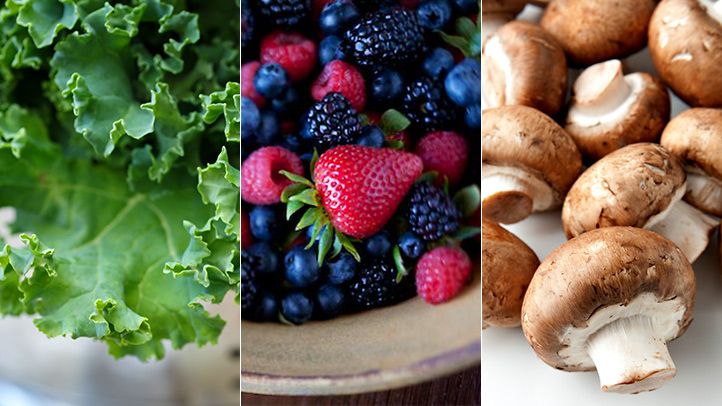Depression and anxiety disorders are mental health issues affecting millions worldwide. While therapy, medication, and lifestyle modifications are effective treatments, diet can also aid in symptom management. Some foods have mood-boosting properties that help reduce depression and anxiety; here are the top ten. Dark leafy greens are rich in folate, while fatty fish like salmon contain omega-3s, both of which regulate mood. Nuts and seeds are packed with magnesium and zinc, which reduces symptoms of anxiety and depression. Whole grains, with their complex carbohydrates, can help regulate blood sugar levels. Berries have antioxidants that protect the brain from inflammation and oxidative stress. Herbal teas promote relaxation, while avocado is rich in fiber, potassium, and healthy fats. Turmeric, which has anti-inflammatory and antioxidant properties, helps reduce symptoms of anxiety and depression. However, it’s important to note that these foods can aid in symptom management, but they aren’t a replacement for medication, therapy, and lifestyle changes.
10 Foods That Fight Depression and Anxiety
Depression and anxiety disorders are serious mental health problems that affect millions of people worldwide. While therapy, medication and lifestyle changes are the most effective treatments, diet can also play a crucial role in managing symptoms. Some foods are known to have mood-boosting properties that can help reduce stress, anxiety and depression. Here are 10 of the best foods you can add to your diet to fight depression and anxiety.
1. Dark Leafy Greens
Kale, spinach and other dark leafy greens are rich in folate, a B-vitamin that contributes to the production of brain chemicals that affect mood, including serotonin and dopamine. Studies have shown that low levels of folate are associated with depression and that increasing your intake can help improve symptoms, especially in women.
2. Fatty Fish
Fatty fish like salmon, mackerel and sardines are rich in omega-3 fatty acids, which are essential for brain function and mood regulation. Studies have shown that people who consume more omega-3s have lower rates of depression, and that supplementation can improve symptoms in people with depression and bipolar disorder. Aim for at least two servings of fatty fish per week.
3. Nuts and Seeds
Nuts like almonds, walnuts and cashews, and seeds like pumpkin and sunflower seeds, are packed with nutrients that are essential for brain health, including magnesium, zinc and vitamin E. Research has shown that these nutrients can help reduce symptoms of anxiety and depression, and that consuming a diet rich in nuts and seeds is associated with better mental health outcomes.
4. Whole Grains
Whole grains like oats, brown rice and quinoa contain complex carbohydrates that help regulate blood sugar levels and provide a steady source of energy to the brain. They also contain B-vitamins and minerals like magnesium and selenium, which are important for mood regulation. Studies have shown that consuming a diet rich in whole grains can help reduce symptoms of depression and anxiety.
5. Dark Chocolate
Dark chocolate is rich in flavonoids, a type of antioxidant that has been shown to have mood-boosting properties. Research has found that consuming dark chocolate can help reduce symptoms of anxiety and depression, and that the effects are similar to those of prescription antidepressants. Look for dark chocolate with at least 70% cocoa solids.
6. Fermented Foods
Fermented foods like kimchi, sauerkraut, kefir and yogurt are rich in probiotics, or beneficial bacteria, that help promote gut health. Studies have shown that there is a strong link between gut health and mental health, and that consuming probiotics can help reduce symptoms of depression and anxiety. Incorporate fermented foods into your diet regularly.
7. Berries
Berries like blueberries, strawberries and raspberries are rich in antioxidants, which help protect the brain from oxidative stress and inflammation. Studies have shown that consuming berries can help reduce symptoms of anxiety and depression, and that the effects are stronger in people with lower levels of well-being.
8. Herbal Teas
Herbal teas like chamomile, lavender and lemon balm have been used for centuries to promote relaxation and reduce stress and anxiety. Research has found that these teas can help reduce symptoms of anxiety and depression, and that they are a safe and effective alternative to prescription medications for some people.
9. Avocado
Avocado is rich in healthy fats, fiber and potassium, which help support brain health and mood regulation. Studies have shown that consuming avocado can improve symptoms of anxiety and depression, and that it can also help improve sleep quality, which is crucial for mental health.
10. Turmeric
Turmeric is a spice that has been used in traditional medicine for centuries to treat a variety of ailments, including mood disorders. It contains a compound called curcumin, which has strong anti-inflammatory and antioxidant properties. Studies have shown that consuming turmeric can help reduce symptoms of anxiety and depression, and that it may be as effective as prescription antidepressants for some people.
Conclusion
While diet alone cannot cure depression and anxiety, incorporating these mood-boosting foods into your diet can help support mental health and reduce symptoms. Remember to also prioritize therapy, medication and lifestyle changes as part of a comprehensive treatment plan.
